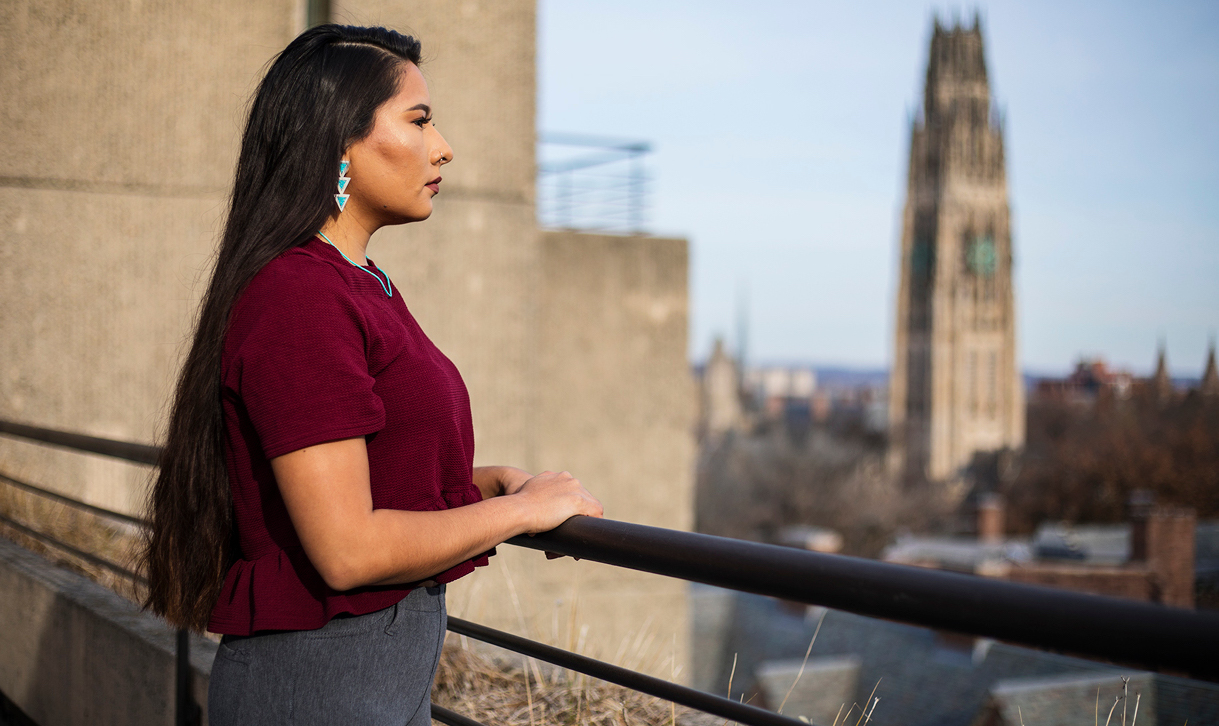For ritual’s sake, it took about a dozen pairs of scissors to cut the blue ribbon and open New Haven’s newest institution of learning, located four blocks away from Yale’s Old Campus. When the ribbon fell, the couple hundred attendees cheered. The celebrations, attended by an estimated total of eight hundred people, would continue for at least seven hours.
The public ceremonies August 29 marked the opening of Gateway Community College, whose student population is currently comparable to Yale’s in number. The main campus’s move downtown, to a building just four blocks from Old Campus, is expected to increase Gateway’s enrollment capacity to roughly fifteen thousand. It took nine years to plan and construct the 360,000 square foot space and the building is LEED-certified, meeting US Green Building Council standards for sustainability.
At the ceremony, Gary Cole, a 1976 Gateway graduate, ate at a table outside where he could follow the festivities and compared the smaller Long Wharf campus to the new building. A disabled veteran in his late-sixties, he said he attended school with fellow veterans, all taking advantage of their benefits. Cole, who pays the Gateway tuition for his granddaughter, spent the grand opening talking to other Gateway alumni, appreciating those who remembered him and remembered their former professors.
“I hope they get involved with Yale,” he said of the school’s new campus. “Because it’s downtown, they can get affiliated.”
The question remains: how will Yale interact with the community college’s main campus move to the corner of Church and George?
One Gateway alumnus is sure that these new faces, while bringing business to downtown New Haven, won’t be wildly welcome to mingle with the Yalies.
“They always looked down on us,” said Sasha Lay, who graduated from Gateway’s North Haven campus in May and has started at Southern Connecticut State University. “Yale students really like to keep to themselves.”
The former Director of Career Services at Gateway, Robert A. Miles, called Yale and Gateway “different universes.” The average age of a Gateway student is 29, he said, and the majority of students attend part-time to get their Associate degrees. Still, Miles, who retired in 2009, is hopeful that the two schools will partner—socially, philosophically, academically, economically—and that Yale will mindfully create space for Gateway in New Haven.
When asked whether Yale supports Gateway financially, a representative of Yale’s Office of New Haven and State Affairs Lauren Zucker responded, “Yes, we are supportive of Gateway and continue to work closely with them.”
Hundreds gathered to hear speeches by many involved in the school, including executives involved in the construction, the President of the school, and politicians Mayor John DeStefano, Congresswoman Rosa L. DeLauro, U.S. Senator Richard Blumenthal, State Senator Martin Looney, and Gov. Dannel P. Malloy.
Malloy stressed that the celebration was in honor of “not bricks and mortar, but our future” and that the opening of the Church Street location was a step, not an end. He spoke for Connecticut when he said, “we will have no progress in this state unless we throw our shoulder to the wheel, unless we produce the kind of product in this state that will allow us to compete with the rest of the world.”
While most listened to the series of speeches, many, like Cole, wandered the school’s halls, filled for the occasion with booths for various New Haven staples.
At one booth sat Peter Johnson DIV ’02, who wore a bowtie and said that he hoped to start Christian programming at the college.
Some smaller booths ran out of food, and free samples abounded. The cafeteria was also up and running. An older woman, wearing a cap, asked for the price of a sandwich. It was free, and, pleased, she ate her sandwich at an available table. For those who grew hungry, the Boar’s Head booth served a selection of packed sandwiches and Temple Grille took orders for custom-made salads. One mother sat by the kiosks with her two children outside the auditorium, where only standing space was left. Inside, the Elm City Co-op Market laid out fresh apples across from a salon’s hair braiding station, and hushed chatter came from the high-ceilinged new cafeteria.
The afternoon brought a series of group tours through the ninety classrooms, library, culinary center, and various other facilities. It looked very different from Gateway’s previous main campus—the tour attendees enjoyed pointing out different academic spaces.
Like Yale’s campus, the building creates its own unique space in downtown New Haven. The standardization of form and style that dominate its two blocks set it apart from the rest of the neighborhood. However, its spaces, unlike Yale’s, are centered around the indoors.
The city’s leaders hope the new addition to the skyline will become a symbol of community and hope for New Haven. “While there is another college downtown, Gateway Community College will be the first college they will see and it will be the college that will serve our families, our businesses and deliver our possibilities and opportunities,” DeStefano said at the event.


